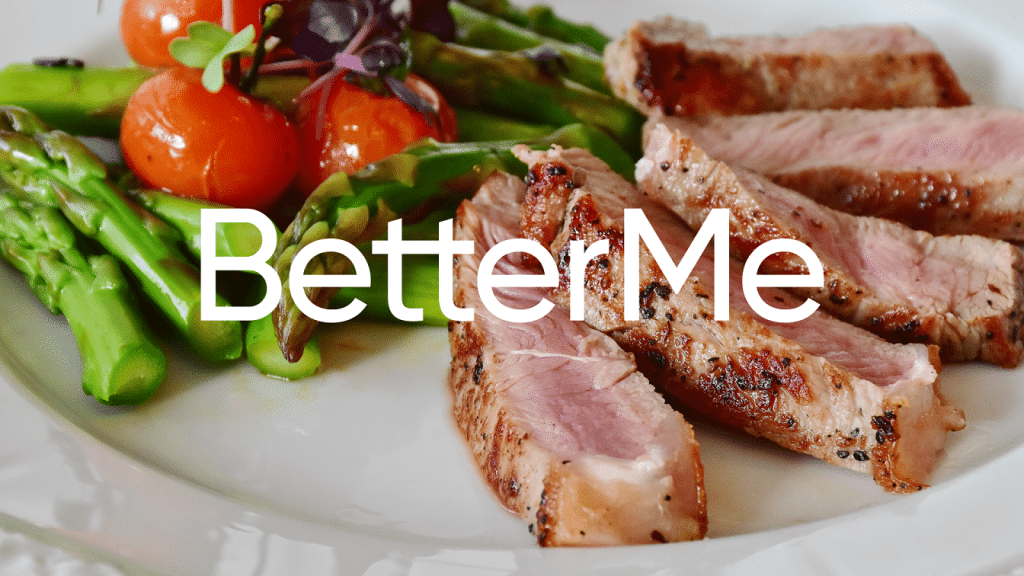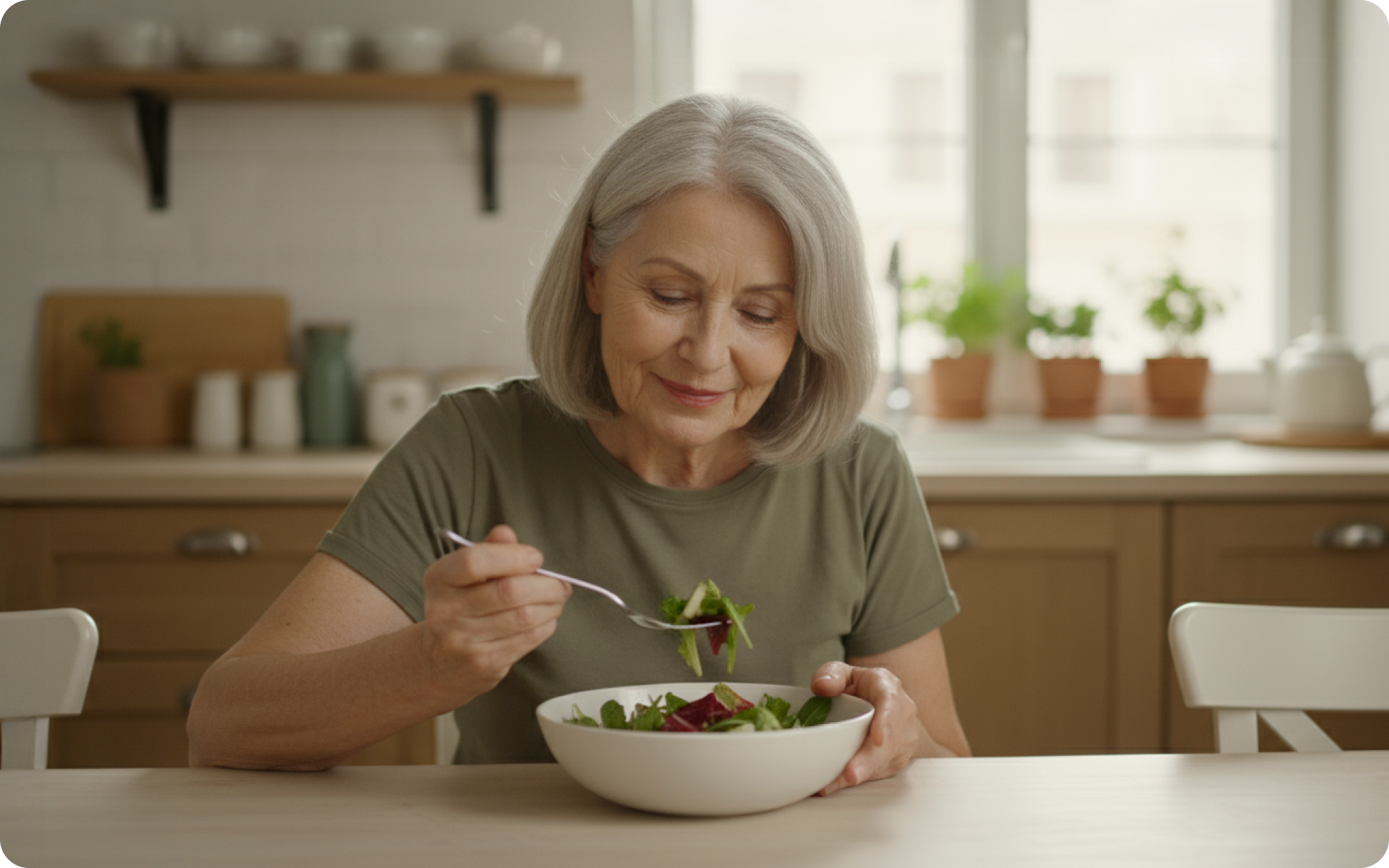We’ve all heard the old adage “You are what you eat.” And for those women living with polycystic ovarian syndrome (PCOS), this is proving to be quite true. By focusing their diets on those foods that help regulate blood sugar and insulin levels, they can reduce symptoms of PCOS such as acne, excessive hair growth, and irregular periods (3). The good news is these changes don’t have to be drastic or time-consuming – they simply require some basic dietary changes that will have you well on your way to feeling more like yourself in no time! In this article, we look at those foods to avoid with PCOS.
Get your personalized
meal plan!
What Is PCOS And How Does It Affect Your Diet?
Polycystic Ovarian Syndrome (PCOS) is a common condition that causes changes in the ovaries, breasts, skin, and hair. As well as health problems like weight gain and acne (6).
PCOS affects how insulin works (6). Insulin is a hormone that helps glucose enter cells for energy use. If your insulin does not work properly then your glucose stays in your blood instead of moving into cells for energy use. This means you may feel hungry more often as you are unable to get enough energy from food alone.
Once you start eating, insulin’s work is to open your cells so glucose can enter and be used as a source of energy for the human body. If your insulin is not working well then it cannot do this properly and you may have higher levels of glucose in your blood even after meals – high blood glucose. This can make you feel tired and hungry more often. This means that some people with PCOS may need to eat more at each meal to try to control their hunger.
Eating a high-carb diet can make PCOS symptoms worse. Starchy foods can cause a spike in blood glucose levels which may make you hungrier than usual. Eating too many calories from such foods can also frustrate your weight loss attempts.
Read More: Best Foods For PCOS: Eat This To Help Manage Your Condition
 Foods Women With PCOS Should Avoid
Foods Women With PCOS Should Avoid
If you have Polycystic Ovary Syndrome or are looking for ways to manage your weight without sacrificing other factors, consider the following foods that are best avoided:
Red Meat
This is a food that most people steer clear of when trying to manage their weight and/or reduce their symptoms. However, for women who have PCOS, you should be careful. Red meat is high in saturated fat, which can aggravate certain conditions and lead to further health problems. In short, it should be avoided at all costs.
However, you don’t have to go completely vegetarian in order to help your condition – there are several other types of protein that can provide a healthy alternative. For example, fish is a great option. Fish, such as cod or salmon, is high in Omega-3’s, which can help keep your cholesterol levels in check and even reduce inflammation in your body.
Processed Foods
While it’s known that processed food should be avoided at all costs due to the additives and preservatives that remain after processing, this is especially true for women with PCOS because these foods are often loaded with sugar.
Women who have PCOS should try to avoid added sugar altogether – not just by skipping candies and chocolates, but also by ruling out regular soft drinks and fruit juices from their diet because of the large amounts of hidden sugar. Sugary condiments like ketchup and syrups are also to be consumed with moderation.
The recommended alternative to processed foods is to stick with fresh food – like fruits and vegetables. This is especially true for women who have PCOS because these foods are high in fiber, which can help keep you feeling full on a smaller amount of calories.
As an added bonus, these foods are also low in sodium and fat, making them healthier options than some of the junk that’s found on supermarket shelves today.
 Soda
Soda
If you have PCOS, you should also keep an eye on your soda consumption. While it’s unlikely that drinking a single can of soda is going to make or break the course of your condition, consuming this type of beverage on a regular basis certainly isn’t going to help matters in any way.
Caffeine can impair insulin reaction and also make you feel hungry – neither of which are good for women who have been diagnosed with diabetes or women who want to manage their diets and limit calories without feeling constantly unfulfilled.
By avoiding soft drinks altogether, you can save yourself from unwanted cravings later and raise your metabolism slightly. And remember: diet affects how food tastes! So if you’re used to eating candy with your soda, try a few drops of lemon juice or use a natural sweetener instead.
Looking for a way to break the vicious cycle of weight loss and tone up all the jiggly parts? Watch the extra pounds fly off and your muscles firm up with the BetterMe app!
White Rice
White rice has been linked to insulin resistance and thus you are better off avoiding it if you want to reduce your symptoms associated with PCOS. Brown rice is a better option as it takes longer for the body to convert it into sugars and thus does not cause high spikes in blood sugar levels. Brown rice also contains fiber which helps to keep the intestines healthy and regular (5).
 Potatoes
Potatoes
As with white rice, potatoes should also be consumed with moderation because they cause an excessive spike in blood glucose levels. Sweet potatoes on the other hand have a higher fiber content which makes them a better option as they have lesser carbohydrate content than white or red potatoes and promote the steady release of sugars into the bloodstream rather than large releases that cause spikes in blood sugar levels (4).
Sugar
Fructose is a type of sugar that can be found in foods such as fruits, honey, and vegetables. When it comes to PCOS, foods with high amounts of fructose should be avoided because they usually raise insulin levels hence increasing the amount of testosterone estrogen ratio is also lowered (4).
Eating too much sugar will only increase the risk of developing diabetes which is a common problem among women who have polycystic ovarian syndrome (PCOS) (6). This high level of sugar causes the body to store fats around the waist making it harder for women to lose weight.
Read More: How To Lose Weight With PCOS: 5 Easy Dietary Tweaks
 Fried Foods
Fried Foods
If you’ve ever looked at the back of a fast-food bag to see how many calories are in that burger – and then immediately thrown it away in disgust – because you know that is not what you should be eating … well, now you know why!
With so many different fried fast foods available on every street corner these days, it’s easier than ever for women with PCOS to overindulge on greasy and fatty morsels. But the more often you do this, the harder it will become to limit portion sizes and avoid getting too full at mealtime.
More importantly, hydrogenated oils (trans fats) in fried foods are high in pro-inflammatory Omega 6 fatty acids. When you eat these types of food it could create a massive inflammatory response that will slow down your metabolism, increase body fat and interfere with weight loss (9).
Nitric oxide is produced by the immune system during inflammation. And nitric oxide interferes with blood sugar control and insulin function to make you more likely to develop diabetes and/or PCOS (9).
Free Radicals are also released during inflammation, which can damage your cells. Inflammation can even increase oil production in your sebaceous glands, further disrupting hormonal balance and making you prone to acne breakouts (9).
These same Omega 6 fats also cause oxidative stress on your skin cells creating free radical damage that can lead to premature aging of the skin as well as hyperpigmentation and sunspots (9).
In addition to being packed with fat, fried foods are also notoriously high in sodium – and this is not good for anyone, but especially for women with PCOS. By avoiding these foods, you can help keep your blood pressure down and prevent additional complications due to hypertension.
Foods that are good for people with PCOS include (4):
- Foods high in fiber such as oatmeal, raspberries, black beans, chickpeas, blueberries, green beans, carrots, and strawberries.
- Foods rich in minerals such as sweet potato, spinach, broccoli, pumpkin seeds, and peanuts.
- Foods high in vitamin D such as salmon and tuna.
- Foods rich in vitamin E such as sunflower oil and almonds provide antioxidant benefits.
- Foods rich in vitamin B provide antioxidant benefits and reduce the risk of diabetes: kefir, yogurt, edamame, lentils, broccoli, salmon are good for PCOS.
- Foods high in protein such as tofu, eggs and shrimp can be a good source of protein.
- Foods rich in calcium such as cheese and yogurt.
- Foods rich in omega-3 fatty acids such as tuna, salmon and edamame are good for healthy eating and can be a good source of protein.
- Foods high in vitamin B6 such as bananas and sweet potatoes help with balancing hormone levels by influencing the production of serotonin and dopamine, which have been linked to mood disorders associated with polycystic ovary syndrome.
- It has been shown that not all meat is bad. Lean meat can be part of a balanced diet during pregnancy if it is low in saturated fats.
- Chicken breast without skin can be consumed once or twice per week. If you do eat chicken, make sure it is skinless and remove the skin from the chicken before cooking.
- Foods with low glycemic index such as quinoa, barley, or lentils can be a good source of energy for you to stay active.
- Low-carb foods are considered helpful if you have PCOS because they reduce insulin levels in your body by inhibiting glucagon release. Quinoa, whole-wheat pasta, or brown rice are all good substitutes for simple carbohydrates such as white flour or sugar that are typically found in bread, cereal, and noodles.
- Foods rich in monounsaturated fats such as salmon, beans, and avocados help lower cholesterol levels and are healthy fats that do not cause weight gain.
If you tend to let yourself off the hook, raise the white flag when things get tougher than you expected, send yourself on an unconscious binge-eating trip – BetterMe app is here to help you leave all of these sabotaging habits in the past!
 Other Lifestyle Changes That Can Help You Manage PCOS Symptoms
Other Lifestyle Changes That Can Help You Manage PCOS Symptoms
Exercise
Combining PCOS with physical activity can help improve your symptoms. Studies have shown that a combination of a low glycemic diet and exercise can reduce insulin resistance by 50% in 2 weeks without any drug intervention (2). One study published in Current Obesity Reports revealed that a weight loss of as little as 5-10% can reduce insulin resistance in overweight women (10).
The benefits of exercise for women with PCOS include (8):
- Weight loss
- Improved insulin sensitivity
- Reduced depression and anxiety
- Reduced risk of developing diabetes
- Increased energy levels
A study showed that aerobic exercise alone can improve your weight management while improving PCOS symptoms. According to the NIH, “exercise reduces an insulin-resistant woman’s risk of gestational diabetes by about 50 percent (1).”
Recommended exercises for managing PCOS include:
- Brisk walking or jogging on a regular basis.
- Swimming or cycling for energy expenditure without damaging the joints.
- Yoga to help with weight management, relaxation, stress relief and the ability to focus. Check out this article for more information on physical activity: Physical Activity and PCOS.
 Relieve Stress
Relieve Stress
Stress is pervasive. We all feel it at some point in our lives, and for women with PCOS, this feeling can be heightened due to the additional factors of hormonal imbalances and physical changes that take place within your body as a result of having PCOS.
Having PCOS causes the body to produce higher levels of male hormones called androgens or testosterone. Androgens are responsible for stimulating the production of sebum (skin oil produced by glands in hair follicles) which clogs pores and triggers acne outbreaks among other things – such as hair growth on your face (7)!
Stress increases the production of these same hormones, creating an almost endless cycle – making you more susceptible to acne from stress alone…even without being affected by any external factors.
But this is not all that stress does to you…
Stress can also cause many other negative reactions in your body, such as increasing blood pressure and causing a spike in the levels of cortisol within your body (a hormone that causes inflammation) (7).
Some effects of cortisol on the body include: decreasing carbohydrate metabolism, worsening insulin resistance, and increasing weight retention – all things that are harmful to your overall health when you’re dealing with PCOS (7).
Here are some suggestions for relieving stress for women with PCOS.
 Be In The Present
Be In The Present
Focus on what is going on NOW – do not let worries take over your mind! This is especially important when getting ready for a big event, such as a wedding or other type of special occasion that may make you anxious and nervous if you’re trying to fit your ‘ideal’ look into a very limited timeframe.
Find peace and contentment with who you are now – do not let others begin placing pressure on you by assuming that your appearance should be altered in every way possible within the next month (or any string of time for that matter)…give yourself MORE time than what others may think is necessary!
Get Outside!
Focus on the beauty of nature. Nature is everywhere – it’s free and always beautiful to look at…get into the habit of noticing it, no matter where you are – whether in your own backyard or when driving past trees along the highway.
Disconnect From Technology
You can’t run from everything bad – so don’t try! Even if just for a short time, disconnecting from technology (even your cell phone!) and social media will give you more time to think about what really matters – such as how great life is regardless of who has had an issue with their appearance in some way online recently…or how lucky we are that our bodies have grown healthy children without too much trouble during pregnancy.
Make Time To Relax
We are constantly on the go, trying to cram all the things we need or want to do into our day. This is not healthy for us physically and mentally! Make a conscious effort to slow down – take a bath every night before bed instead of waiting until the weekend (especially after having stressful events occur at work during the week).
Go outside for a walk around your neighborhood just as dusk approaches so that you can get some fresh air and enjoy this beautiful time of day…don’t forget to breathe deeply! Take some time out each day where you can relax completely and just be by yourself – you deserve it!
The Bottom Line
While many women have an idea about what to eat in order to help manage their condition, they may not be aware of everything that those with PCOS can and should avoid. There are some foods that you can add to your diet – such as walnuts – while there are others you should try to eat in moderation – red meat, for example. Avoiding these foods helps to manage the symptoms of PCOS better and improves one’s overall quality of life.
 DISCLAIMER:
DISCLAIMER:
This article is intended for general informational purposes only and does not address individual circumstances. It is not a substitute for professional advice or help and should not be relied on to make decisions of any kind. Any action you take upon the information presented in this article is strictly at your own risk and responsibility!
SOURCES:
- AEROBIC EXERCISE IN WOMEN WITH POLYCYSTIC OVARY SYNDROME IMPROVES OVARIAN MORPHOLOGY INDEPENDENT OF CHANGES IN BODY COMPOSITION (2011, nih.gov)
- A low-glycemic index diet combined with exercise reduces insulin resistance, postprandial hyperinsulinemia, and glucose-dependent insulinotropic polypeptide responses in obese, prediabetic humans (2010, nih.gov)
- Controlling Your Blood Sugar Can Improve Your PCOS and Hormone Imbalance (2020, clevelandclinic.org)
- Dietary Advice for Polycystic Ovary Syndrome (2019, nhs.uk)
- Effect of Brown Rice, White Rice, and Brown Rice with Legumes on Blood Glucose and Insulin Responses in Overweight Asian Indians: A Randomized Controlled Trial (2014, nih.gov)
- Polycystic ovary syndrome and its impact on women’s quality of life: More than just and endocrine disorder (2009, nih.gov)
- Stress effects on the body (2019, apa.org)
- The Effect of Exercise in PCOS Women Who Exercise Regularly (2010, nih.gov)
- Trans Fatty Acids Induce Vascular Inflammation and Reduce Vascular Nitric Oxide Production in Endothelial Cells (2011, nih.gov)
- Weight Loss and Improvement in Comorbidity: Differences at 5%, 10%, 15%, and Over (2018, nih.gov)







